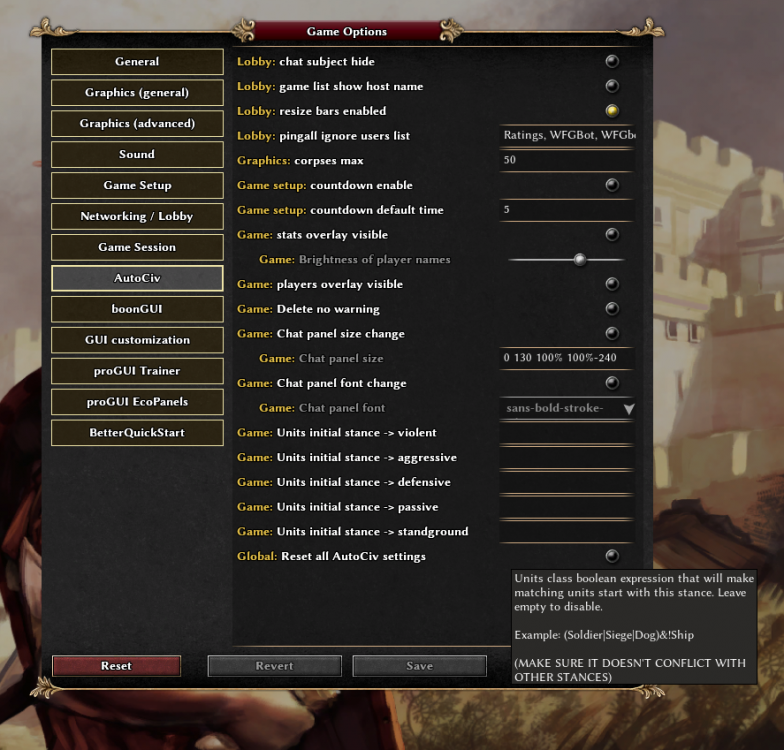-
Posts
25.684 -
Joined
-
Days Won
299
Posts posted by Lion.Kanzen
-
-
How many maps will the campaign have?
I get the impression that there are very few of them.
-
-
-

It would be good to respect the forum categories.
-
I don't know if it's because I'm demanding, but there is always room for improvement.
I miss the size of the art team we had from 2015-2020.
-
 1
1
-
-
-
-
-
30 minutes ago, Atrik said:
@carlosnewmusic
@Lion.Kanzen This option EXIST you can do it with autociv.
https://github.com/nanihadesuka/autociv/tree/master_alpha_26Edit : I've just realized I already posted this exact same reply already lol
Officially I mean.
There are a lot of things those mods offer that I want to see in the game.
-
 3
3
-
-
-
21 minutes ago, Lion.Kanzen said:
But in the days of Caesar Augustus (27 BC-14 AD), he knew by censuses that the population of Romans in the world was declining. He had tried to curb lax morals and encourage marriages by implementing in 18 BC a law making adultery a crime and 27 years later in 9 AD he enacted Lex Papia Poppaea to promote and reward marriage because the number of Roman men who were unmarried was greater than the number of married men. He blamed the low birth rate on on men who preferred the licentiousness of the single life to the responsibilities of married life and children. As Caesar, Augustus saw lax morals and low birthrate as threats to the Roman State. He publicly addressed this problem in the Forum.
https://earlychurchhistory.org/medicine/ancient-roman-abortions-christians/
https://historytravelswithnancy.com/women-ancient-rome/law-&-identity.htm
The Lex Papia Poppaea of 9 A.D. is part of the legislation of Octavian Augustus and, together with the Lex Iulia de maritandis ordinibus of 18 B.C. and the Lex Iulia de Adulteriis Coercendis of 17 B.C., - of which it represented a complement - encouraged and strengthened marriage and childbearing. It also included interventions against adultery.
The law suggested conventional ages within which marriage was required-25 to 60 years for men; 20 to 50 years for women. After this age, those who had not married were declared celibate and faced penalties, which could also weigh on inheritance.
The law was introduced by the 9th year consuls, Marcus Papius Mutilius and Quintus Poppeius Secondo, although they themselves were celibate.
https://es.m.wikipedia.org/wiki/Lex_Papia_Poppaea
(Spanish version).
https://en.m.wikipedia.org/wiki/Lex_Papia_Poppaea
The birth-rate in Rome was still a matter of concern to Augustus, but the legislation of Papius and Poppaeus in AD 9 focussed on freedpersons rather than the senatorial and equestrian orders, offering them incentives to have three or more children.
https://ebrary.net/140779/history/papia_poppaea
More rights for women
As a result of the lex Papia Poppaea, there were changes to regulations on guardianship for women: prior to this law Vestals were the only women who did not need to have guardians, and now the right of children (ius liberorum) allowed both freeborn women and freedwomen the same status as Vestals (Plut. Numa 10.5; Gaius Inst. 1.144-145: docs 7.90, 15.30). Citizen women with three children were exempted from guardianship, and freedwomen with four (if in statutory guardianship), or with three if in other forms of guardianship: the ‘ius trium liberorum’ (right of three children). Women with this right were permitted to inherit more than the maximum amount allowed by the lex Voconia of 169, 100,000 sesterces (Dio 56.10.1-3: doc. 15.27), while widows and divorcées with the prerogative of the ius liberorum were also freed from the obligation to remarry. When Drusus, Livia’s younger son, died in 9, Livia had been given the consolation of being classed among ‘the mothers of three children’ (i.e., given the ius liberorum), so that she could enjoy all the privileges of this status without suffering the penalties resulting from an insufficiency of children (Dio 55.2.5-7: doc. 15.27).
Augustus was attempting to raise the birth-rate among the upper classes, presumably to ensure that senators had sons who could succeed them in their magistracies and military and administrative roles. He may also have been concerned about army recruitment at lower social levels
https://www.worldhistory.org/article/2423/childbirth-in-ancient-rome/
-
But in the days of Caesar Augustus (27 BC-14 AD), he knew by censuses that the population of Romans in the world was declining. He had tried to curb lax morals and encourage marriages by implementing in 18 BC a law making adultery a crime and 27 years later in 9 AD he enacted Lex Papia Poppaea to promote and reward marriage because the number of Roman men who were unmarried was greater than the number of married men. He blamed the low birth rate on on men who preferred the licentiousness of the single life to the responsibilities of married life and children. As Caesar, Augustus saw lax morals and low birthrate as threats to the Roman State. He publicly addressed this problem in the Forum.
https://earlychurchhistory.org/medicine/ancient-roman-abortions-christians/
https://historytravelswithnancy.com/women-ancient-rome/law-&-identity.htm
The Lex Papia Poppaea of 9 A.D. is part of the legislation of Octavian Augustus and, together with the Lex Iulia de maritandis ordinibus of 18 B.C. and the Lex Iulia de Adulteriis Coercendis of 17 B.C., - of which it represented a complement - encouraged and strengthened marriage and childbearing. It also included interventions against adultery.
The law suggested conventional ages within which marriage was required-25 to 60 years for men; 20 to 50 years for women. After this age, those who had not married were declared celibate and faced penalties, which could also weigh on inheritance.
The law was introduced by the 9th year consuls, Marcus Papius Mutilius and Quintus Poppeius Secondo, although they themselves were celibate.
https://es.m.wikipedia.org/wiki/Lex_Papia_Poppaea
(Spanish version).
https://en.m.wikipedia.org/wiki/Lex_Papia_Poppaea
The birth-rate in Rome was still a matter of concern to Augustus, but the legislation of Papius and Poppaeus in AD 9 focussed on freedpersons rather than the senatorial and equestrian orders, offering them incentives to have three or more children.
https://ebrary.net/140779/history/papia_poppaea
More rights for women
As a result of the lex Papia Poppaea, there were changes to regulations on guardianship for women: prior to this law Vestals were the only women who did not need to have guardians, and now the right of children (ius liberorum) allowed both freeborn women and freedwomen the same status as Vestals (Plut. Numa 10.5; Gaius Inst. 1.144-145: docs 7.90, 15.30). Citizen women with three children were exempted from guardianship, and freedwomen with four (if in statutory guardianship), or with three if in other forms of guardianship: the ‘ius trium liberorum’ (right of three children). Women with this right were permitted to inherit more than the maximum amount allowed by the lex Voconia of 169, 100,000 sesterces (Dio 56.10.1-3: doc. 15.27), while widows and divorcées with the prerogative of the ius liberorum were also freed from the obligation to remarry. When Drusus, Livia’s younger son, died in 9, Livia had been given the consolation of being classed among ‘the mothers of three children’ (i.e., given the ius liberorum), so that she could enjoy all the privileges of this status without suffering the penalties resulting from an insufficiency of children (Dio 55.2.5-7: doc. 15.27).
Augustus was attempting to raise the birth-rate among the upper classes, presumably to ensure that senators had sons who could succeed them in their magistracies and military and administrative roles. He may also have been concerned about army recruitment at lower social levels
-
1 hour ago, carlosnewmusic said:
I also think that the default attack mode when creating units should be that or that it can be changed in the game settings.
I've been waiting for that for quite some time.
-
 1
1
-
-
-
-
-
29 minutes ago, AOElover said:
I'm Eva, from Spain. I´ve just registered to thank you guys. This game is amazing

Si y por qué te llmas AoE lover XD?
Broma.
-
11 minutes ago, Grautvornix said:
Sounds great - for a cool "prequel" to the introductory tutorial!
It's not a prequel, things happened before of 237 BC.
-
2 hours ago, ShadowOfHassen said:
Perhaps … we should teach alliances last I remember we were going to just have an allied group help you in one of the scenarios but this could work to as long as @Vantha and @Lion.Kanzen are ok with it
I'm ok.
If I'm not mistaken, Hannibal's father dies in a great battle. What can we make of that?
"Hamilcar probably landed at Gades in the summer of 237 BC. Whatever direct territorial control Carthage had had in the past in Iberia,"
Hamilcar's immediate objective was to secure access to the gold and silver mines of Sierra Morena, either by direct and indirect control.[104] Negotiations with the "Tartessian" tribes were successfully concluded, but Hamilcar faced hostility from the Turdetani or Turduli tribe, near the foothills of modern Seville and Córdoba. The Iberians had support from Celtiberian tribes and were under the command of two chieftains, Istolatios and his brother. Hamilcar defeated the confederates, killed the leaders and several of their soldiers, while he released a number of prisoners and incorporated 3,000 of the enemy into his army. The Turdetani surrendered.
Carthaginians may have taken control of the mining operations and introduced new technologies to increase production.
[...]
Orissus, chieftain of the Oretani tribe, came to the assistance of the besieged town. There are several versions to what happened next: Orissus offered to aid Hamilcar, then attacked the Punic army, and Hamilcar drowned during a retreat across the Jucar river;[115] the Oretani sent ox-driven carts to the Carthaginian position, then set them on fire and Hamilcar died in the resulting melee;[116] Hamilcar accepted an offer to parley, then led the enemy in one direction while Hannibal and Hasdrubal Barca fled in the opposite direction. According to Appian, Hamilcar was thrown from his horse and drowned in a river,[117] but Polybius says he fell in battle in an unknown corner of Iberia against an unnamed tribe.
https://en.m.wikipedia.org/wiki/Hamilcar_Barca
There were several battles before Hamilcar's death.
-
 1
1
-
-
6 hours ago, Vantha said:
include Mastia?
Maybe if there is room. Make it a neighbor of Carthago Nova. North near the edge of the map.
-
6 hours ago, Vantha said:
Hasdrubal
"Hasdrubal the Fair"
6 hours ago, Vantha said:survive a small raid
Difficulty should be driven by raid size.
-
-
-


.thumb.png.ce58cea22940c255f5b0a735d5abee36.png)


Narrative Campaign General Discussion?
in Gameplay Discussion
Posted
Yes, scenarios improving the learning of previous scenarios.